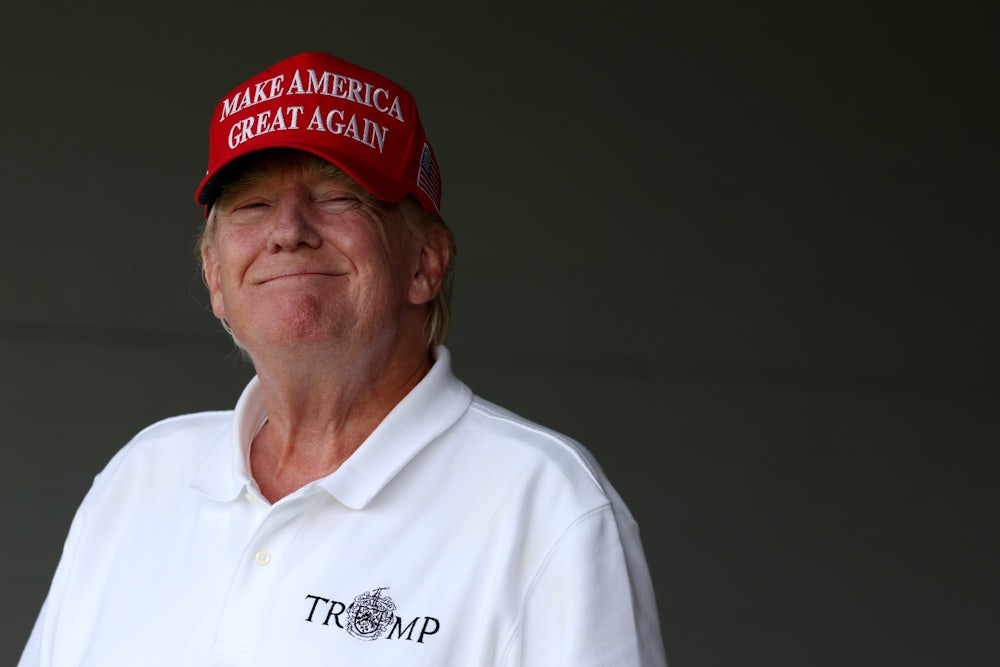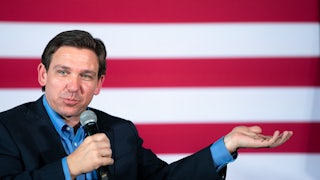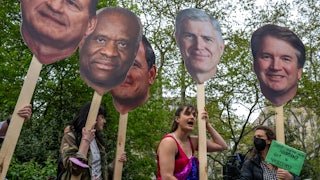More than seven months before the Iowa caucuses, the pundit parade has all but anointed Donald Trump as the GOP nominee for the third time. No matter what befalls him, whether it be a criminal indictment or civil-suit verdict of sexual assault, the conventional wisdom interprets it as another political win for the former president.
The latest case in point is the political press corps’ reaction to the news that Mike Pence, Chris Christie, and Doug Burgum (North Dakota’s billionaire governor) are all slated to join the crowded Republican primary field this week. This array of jostling egos has been largely interpreted as a preordained reprise of the squabbling that aided Trump in 2016 (when, for instance, a pro–Jeb Bush super PAC squandered most of its $118 million on attacking Marco Rubio). The biggest loser of this year’s growing GOP melee, the press agrees, is Florida’s governor. “The rapidly ballooning field,” The New York Times recently stated with Olympian certainty, “represents a grave threat to [Ron] DeSantis, imperiling his ability to consolidate the non-Trump vote.” That view was echoed by NBC’s First Read: “The larger the GOP field that makes it to Iowa, the harder it will be for DeSantis to beat Trump.”
This outbreak of premature certainty reflects the arrogant belief that presidential politics can be handicapped with precision during the spring of an odd-numbered year. In truth, despite the glib predictions of political soothsayers, presidential primary campaigns almost never follow their expected trajectory. The notion that Trump will run away with the 2024 nomination should be treated with the same skepticism that should have greeted the punditocracy’s glib dismissal of his candidacy back in the summer of 2015.
In a different political environment, all these ambitious 2024 Republicans suddenly tossing their hats in the ring could be seen as an indicator of Trump’s weakness. Certainly some of the GOP contenders are gambling on Trump’s legal woes finally catching up with him. And there’s no guarantee that internecine GOP politics will obediently follow the 2016 script. Political scientist Seth Masket smartly points out that by the time you get to Iowa, “you tend to see three or four candidates with the bulk of the vote, and the rest hovering just above zero.” In Masket’s view, “What’s far more important than the number of candidates is the ability of the party to actually winnow the field.”
We simply don’t know what will happen next year. Yes, uttering the deadly words “I don’t know” will automatically get you booted off cable TV. But humility in the face of an uncertain future remains the only sensible mindset for assessing the 2024 terrain.
Unlike political railbirds in Washington, most GOP primary voters are not obsessively following the campaign news. Nearly 30 million Republicans voted in the 2016 primaries. The biggest campaign event of the year so far—CNN’s embarrassingly fawning Trump town hall—was watched by just 3.3 million viewers. That means that about 90 percent of the Republicans who will pick the nominee in 2024 didn’t care enough to spend a May evening on Trump TV.
Remember that the Republicans have not even nailed down the full caucus and primary schedule for 2024. The Iowa caucuses, the New Hampshire primary, and the South Carolina primary are all likely to dominate the news in January. But South Carolina, which has proven influential in the past on the GOP side, already boasts two declared candidates: Senator Tim Scott and former Governor Nikki Haley.
Moreover, February is looking weirdly sparse for the Republicans, with tentatively only the Nevada (February 6) and Michigan (February 27) primaries on the docket. Since voters are heavily influenced by the results of the prior contests, it is nearly impossible to even calculate which early primaries will have shaped the narrative when major states such as California and Texas weigh in on Super Tuesday (March 5).
Political reporters love precedents even more than liberal Supreme Court justices do. But assuming that life began for all modern Republicans with the creation of Fox News in October 1996, that means there have been just four contested GOP presidential primary contests (2000, 2008, 2012, and 2016) in the Rupert Murdoch era. And none of them came off exactly as forecast by the Magic 8 balls of political reporters.
The year 2000 was the most predictable of those four presidential races; Texas Governor George W. Bush was always heavily favored because of his family name and his huge, for the era, political bankroll. But saying that Bush’s road to the nomination was uneventful is akin to concluding that Ted Lasso had a placid coaching career in Premier League soccer. No one handicapping 2020 anticipated that John McCain would sweep New Hampshire in an 18-point landslide and ride into political history with his Straight Talk Express, even though the Arizona maverick fell short in the South Carolina primary and eventually dropped out the following March.
In June 2007, Rudy Giuliani, America’s mayor, had a double-digit lead in the GOP polls over McCain. Of course, maybe the pundits should not have read so much into the early polling since, as a lagging Democratic presidential contender named Joe Biden sniffed to the Associated Press, “This is all spring training, man.” In the end, the overhyped Giuliani campaign (stumbling home with 3 percent in Iowa and 8 percent in New Hampshire) never won a single delegate. McCain, whose campaign was so broke that he had to dismiss most of his staff in July 2007, wrapped up the nomination by prevailing on Super Tuesday against his final rival, former Arkansas Governor Mike Huckabee.
When Mitt Romney declared his candidacy for the 2012 nomination in early June 2011, he was the undisputed front-runner with a double-digit lead in virtually all the national polls. But the GOP race proved so volatile that over the next nine months, four other Republicans took the pole position in national surveys (Rick Perry, Herman Cain, Newt Gingrich, and Rick Santorum). Dan Balz in his book on the campaign, Collision 2012, wrote, “No one thought that Rick Santorum was going to win anything in 2012. He began the campaign in obscurity—overlooked, disregarded and dismissed.” But Santorum—who won the Iowa caucuses (by exactly 34 votes), running as an unabashed social conservative with a moderate stance on economic policy—came within 12,000 votes of beating Romney in the decisive Ohio primary.
As for 2016 … well, that’s quite another ringing endorsement of the pundit class.
When former Florida Governor Jeb Bush declared his candidacy on June 15, 2015, CNN noted, “With a crowded roster of candidates, Bush may not need to win over most Republican primary voters, and only a slice of wary conservatives, to secure the nomination.” As for Donald Trump, he was running at 2 percent in a mid-June 2015 national Monmouth University Poll. Then, on June 16, Trump descended the golden escalator at Trump Tower to announce his candidacy in front of an audience that numbered in the dozens. As the Times wrote, in a story that illustrates the perils of prediction, “It seems a remote prospect that Republicans, stung in 2012 by the caricature of their nominee, Mitt Romney, as a pampered and politically tone-deaf financier, would rebound by nominating a real estate magnate.”
Trump, now with the gasbag winds from TV commentary at his back, may indeed win the nomination in 2024. But the only certainty in politics is that events will offer surprising twists and dramatic hairpin turns along the way.






